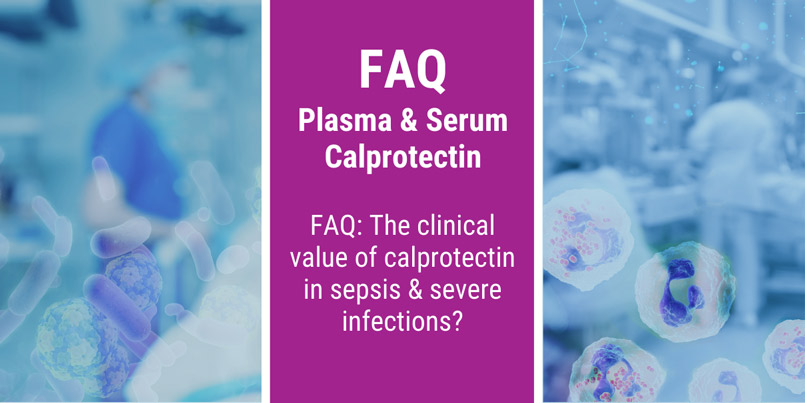
Prediction of severe events in clinical sepsis
Sepsis is a life-threatening organ dysfunction caused by a dysregulated host response to infection. Sepsis is the most frequent cause of admission to ICU and the most common cause of death in critically ill patients1. Rapid and correct diagnosis is very important in sepsis, as any delay in treatment will increase mortality. Since sepsis is often associated with non-specific symptoms it is difficult to diagnose2. In addition, prediction of severe events in clinical sepsis is challenging and of great importance for correct treatment and care of the affected patients.
Calprotectin in severe infection and sepsis
Calprotectin is an anti-microbial protein released by neutrophils in response to infection and has been shown to increase in bacterial infections within only a few hours3-5. This makes calprotectin an ideal candidate for detection and assessment of severe infections and sepsis as early and sensitive biomarker.
Multiple studies have shown that calprotectin levels are elevated in patients with severe infection and sepsis, and confirms that calprotectin can accurately diagnose sepsis6-10. In addition, calprotectin can be a predictive biomarker for the development of severe infection8,11,12 and baseline levels in sepsis patients as well as changes in calprotectin can be predictive for patient outcome6,7,9,10,13. Importantly, calprotectin has shown to be able to distinguish between viral and bacterial infection14-16 which is crucial for decisions and about the course of treatment and antibiotic use.
Moreover, calprotectin has also been reported to be earlier and superior biomarker in severe infection compared to other inflammatory markers, like C-reactive protein (CRP), procalcitonin (PCT) and heparin-binding protein (HBP), in diagnosis, prediction and distinction between viral infection and bacterial infection5-7,12,14.
Calprotectin and sepsis:
- Severe infections and sepsis are a life threating global health burden
- Calprotectin is an early and sensitive biomarker upregulated in the inflammatory response to infections
- Calprotectin measurements can assess the development and course of severe infections
- Calprotectin can reliably distinguish between viral and bacterial infections
Contact us
Do you have questions about GCAL® or calprotectin in severe infections? Send an email to marketing@gentian.com or fill out the form below and our Product Manager for GCAL® will answer your questions.
FAQ about plasma and serum calprotectin
What type of assay is the Gentian Calprotectin Immunoassay GCAL®?
What is calprotectin’s role in neutrophil activation?
What is the value of calprotectin in blood as biomarker in IBD?
Is calprotectin upregulated in sepsis in COVID-19?
What role can plasma & serum calprotectin play in severe COVID-19?
How is calprotectin useful to monitor treatment response in rheumatoid arthritis?
How is calprotectin useful in clinical assessment of rheumatoid arthritis?
What role has circulating calprotectin in vasculitis?
References:
- Singer M et al. The Third International Consensus Definitions for Sepsis and Septic Shock (Sepsis-3). Jama. 2016.
- Kaukonen KM et al. Systemic inflammatory response syndrome criteria in defining severe sepsis. N Engl J Med. 2015.
- Lipcsey M et al. The time course of calprotectin liberation from human neutrophil granulocytes after Escherichia coli and endotoxin challenge. Innate Immun. 2019.
- Vandal K et al. Blockade of S100A8 and S100A9 suppresses neutrophil migration in response to lipopolysaccharide. J Immunol. 2003.
- Fullerton J et al. 40th International Symposium on Intensive Care & Emergency Medicine. Critical Care. 2020;24(1):P477.
- Wirtz TH et al. Association of Serum Calprotectin Concentrations with Mortality in Critically Ill and Septic Patients. Diagnostics (Basel). 2020.
- Larsson A et al. Calprotectin is superior to procalcitonin as a sepsis marker and predictor of 30-day mortality in intensive care patients. Scandinavian Journal of Clinical and Laboratory Investigation. 2019.
- Huang L et al. Serum Calprotectin Expression as a Diagnostic Marker for Sepsis in Postoperative Intensive Care Unit Patients. J Interferon Cytokine Res. 2016.
- Simm M et al. Performance of plasma calprotectin as a biomarker of early sepsis: a pilot study. Biomark Med. 2016.
- Gao S, Yang Y, Fu Y, Guo W, Liu G. Diagnostic and prognostic value of myeloid-related protein complex 8/14 for sepsis. Am J Emerg Med. 2015.
- Jonsson N et al. Calprotectin as an early biomarker of bacterial infections in critically ill patients: an exploratory cohort assessment. Crit Care Resusc. 2017.
- Parke Å et al. 40th International Symposium on Intensive Care & Emergency Medicine. Critical Care. 2020.
- Dubois C et al. High plasma level of S100A8/S100A9 and S100A12 at admission indicates a higher risk of death in septic shock patients. Scientific Reports. 2019.
- Havelka A et al. Calprotectin, a new biomarker for diagnosis of acute respiratory infections. Scientific reports. 2020.
- Siljan WW et al. Inflammatory biomarkers are associated with aetiology and predict outcomes in community-acquired pneumonia: results of a 5-year follow-up cohort study. ERJ Open Res. 2019.
- Bartáková E et al. Calprotectin and calgranulin C serum levels in bacterial sepsis. Diagn Microbiol Infect Dis. 2019.

-1.jpg)
.png)